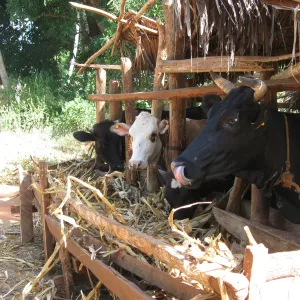Business-to-business workshops promote technology uptake among agripreneurs in Tanzania
As part of efforts to enhance sustainable access to livestock inputs and services, the International Livestock Research Institute (ILRI) and partners in Tanzania are collaborating to equip youth and women with entrepreneurial skills and digital tool kits. The objective is to establish anchors for more widespread benefits across society. Under the CGIAR Initiative on Sustainable Animal Productivity (SAPLING), the institute,

Business-to-business workshops promote technology uptake among agripreneurs in Tanzania
As part of efforts to enhance sustainable access to livestock inputs and services, the International Livestock Research Institute (ILRI) and partners in Tanzania are collaborating to equip youth and women with entrepreneurial skills and digital tool kits. The objective is to establish anchors for more widespread benefits across society.
Under the CGIAR Initiative on Sustainable Animal Productivity (SAPLING), the institute, alongside the Tanzania Livestock Research Institute and Kuza Biashara, has engaged youth and women in capacity building and a series of business-to-business workshops since March 2024.
Subsequent physical business-to-business workshops were held in May and October 2024, in addition to several virtual engagements.
Amos Omore, the SAPLING lead and ILRI’s country representative in Tanzania, highlights the need to promote greater adoption of scale-ready innovations involving bundled inputs and services, including breeding, feeds, forages and animal health.
The use of innovative delivery models and the creation of linkages between farmers, agripreneurs and larger-scale service providers are promising entry points for promoting technology uptake and enhancing productivity.
Digital tools are providing new opportunities in this effort.
The business-to-business approach enhances extension service delivery without significant government investment. It translates to a win-win for agripreneurs, input suppliers and farmers.
Agripreneurs benefit from capacity building and linkages to deliver bundled inputs and services to farmers cost-effectively, whereas the linked suppliers benefit from aggregated demand and more sales.
Photo: Maize stover is a main cattle feed during the dry season in Tanzania (ILRI/Brigitte L. Maass)

